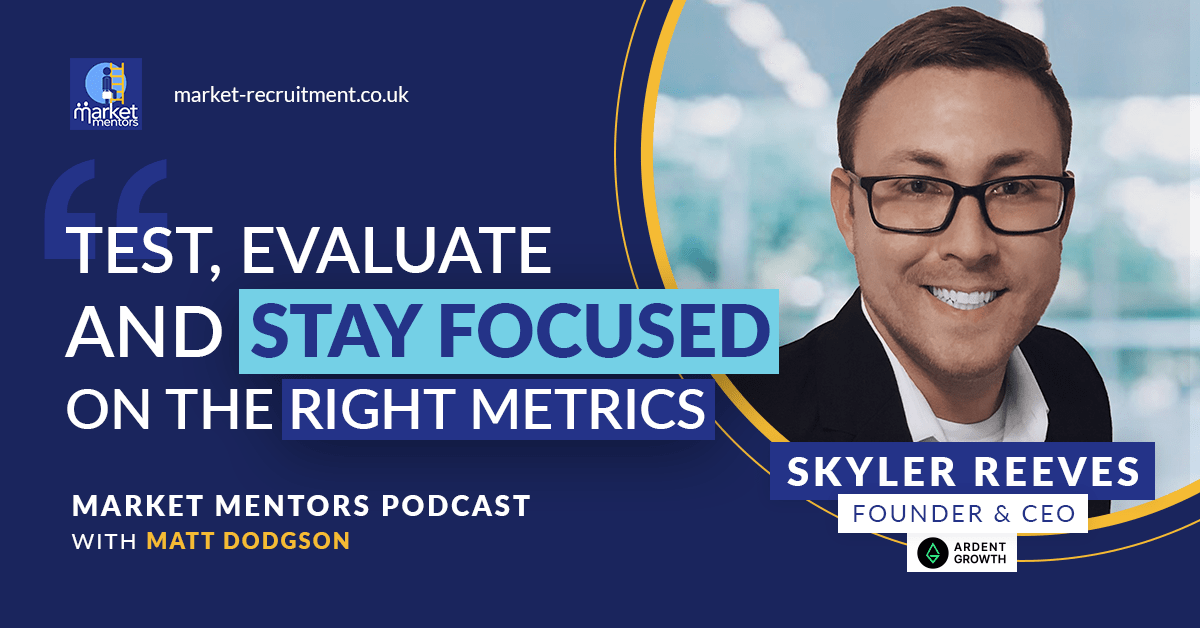
Despite the huge growth in popularity of B2B content marketing in recent years, far too many businesses are still making the critical mistake of focusing on themselves first, rather than focusing on what really matters – the customer.
In this episode, Skyler Reeves talks to Matt Dodgson about the importance of placing your target audience, or ideal customer, at the core of your content marketing strategy to ensure it’s successful.
Who they are: Skyler Reeves, Founder and CEO of Ardent Growth.
A bit of background: Skyler started his career in engineering and computer science, but eventually became interested in content marketing when working on a web design project. He’s since founded his own B2B content marketing agency, Ardent Growth, which launched in 2018.
Where you can find him:
Here you’ll find some of the best advice from the podcast that you can easily digest and learn from.
Content marketing is nothing new. We’re all well versed in the concept by now, and have probably been doing some form of content marketing for years (for some businesses, maybe even without realising it).
But, as we also know, the marketing landscape is ever-changing. The way you approach your content strategy must adapt to keep up with customer expectations and emerging trends. Skyler believes that the most important thing for any content marketer right now is to focus on the customer.
He said, “I started with the inbound model back around 2005 or 2010. The buying landscape was shifting then, as people wanted to research and find information online, and they’re still doing that today. Now, it’s beginning to shift again. That’s why it’s important to think about content beyond just channels like search. You should think about content across social media as well; true, meaningful, engaging content.”
“The primary reason for this is people want to search and find things out about a company, service, or product as much as they possibly can before they actually engage with any sort of sales rep or anything like that. So, the way to actually give your customers that information, and let buyers buy the way they want to buy, is through content.”
This trend of using content to provide more genuine value and education to your target audience is so important, as it helps you build a relationship with your customers based on trust. Skyler believes marketers’ attention has been too focused elsewhere in recent years, and he’s excited about where this changing marketing landscape is heading.
He added, “I think that, over the years, we’ve become so dependent on tracking and attribution and things like that, instead of spending more time talking to our customers, listening to them, understanding where they are, and what kind of information they like to consume.”
“If you remove all the tracking and attribution from that, as long as you listen to your customers, produce content they want, and put it where they hang out then it’s not going to matter. Nike didn’t become Nike from having email tracking and worrying about privacy policies. So, maybe it will re-centre us back to focusing on brand and customer experience.”
Of course, in such a fast-moving landscape, there are plenty of new pitfalls and challenges emerging all the time as well. While practicing content marketing is obviously crucial, getting it right is a whole different conversation.
Two of the biggest mistakes Skyler sees businesses make with their content marketing strategies are:
In terms of creating content for the wrong reasons, he explained, “Let’s say it’s a primarily B2B SaaS company, or some service-based businesses, they want leads instead of thinking about the quality of those leads and how many are going to turn into close one in the pipeline. And so, whenever you produce content for the wrong metrics, you end up engaging in the wrong behaviours that don’t necessarily tie themselves to business metrics or the right outcomes.”
So, it seems you need to ensure you’re aligning your content marketing strategy with the things that really matter most to your overall business. In doing that, it’s important to focus on tracking and measuring the right metrics too.
Skyler continued, “I think the other reason is they look at it as a check in the box a lot of times, especially when handling content across different platforms. Maybe they’re doing really well on one channel, so they decide they want to expand on other channels. Instead of focusing on how the content needs to be created, what content needs to be created, and how it needs to be delivered on that channel, they just sort of remix it and produce it across the other channel, which doesn’t always resonate with people.”
To go back to the original question, then, avoiding the mistakes that cause most content marketing strategies to fail really requires you to focus more on your customer.
Skyler added, “Fundamentally, these mistakes come down to businesses not listening or talking to their customers, and aligning themselves with what they want instead of what their customers want. My belief is that if you align yourself with what your customers want, ultimately it works out best for your business anyway.”
Unsurprisingly, Skyler believes the key characteristic for anyone working in content marketing is the ability to understand the customer and how they see the product or service you’re trying to sell.
More specifically, though, he outlined four key attributes required to make a content marketing team effective:
“They don’t necessarily need to be four different people,” said Skyler. “But they are the skill-sets that your team needs to have from a content marketing stand-point. If you can find two people that have a balance of each skill-set, or maybe have the three with an SME available, then I think you can execute very, very well.”
Subscribe to our fortnightly newsletter to hear about our latest podcasts, blogs, career advice & jobs.